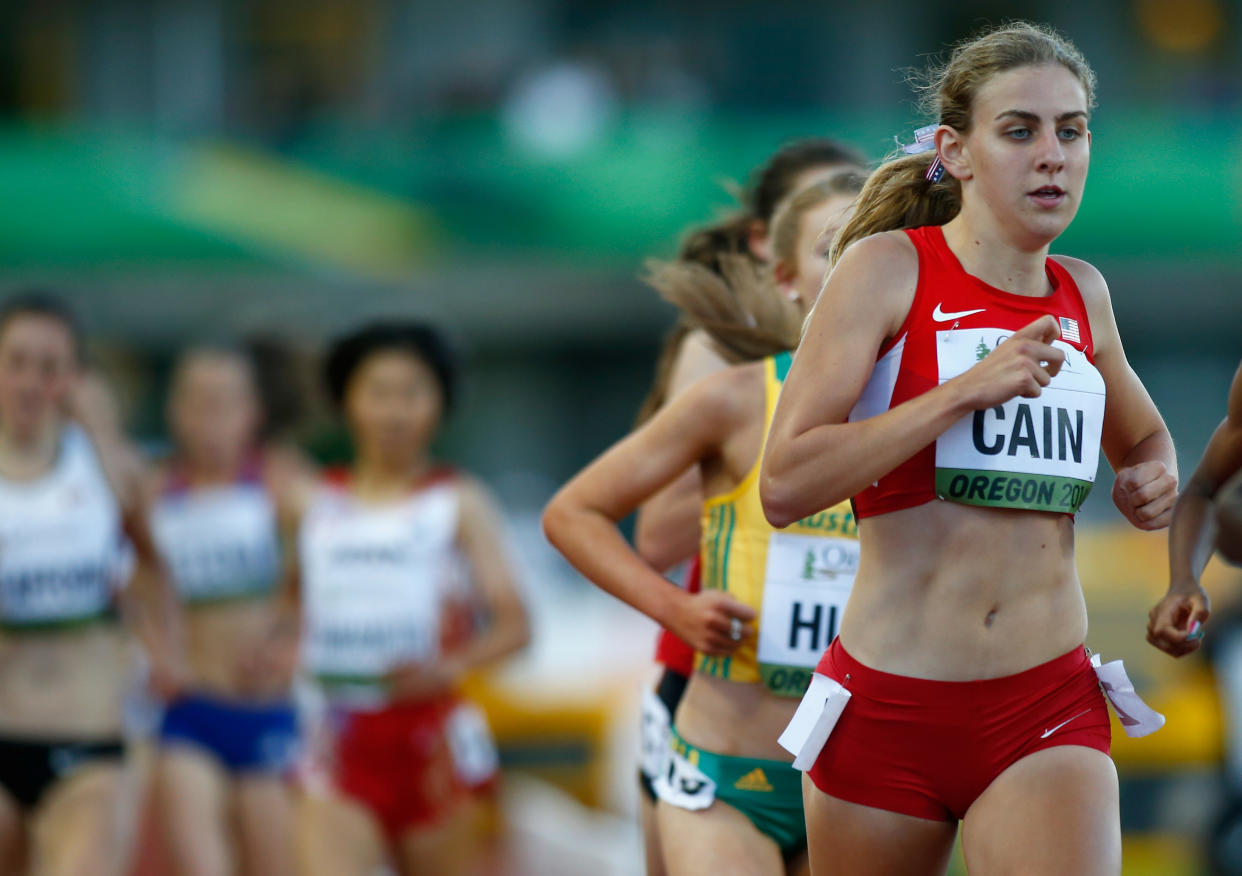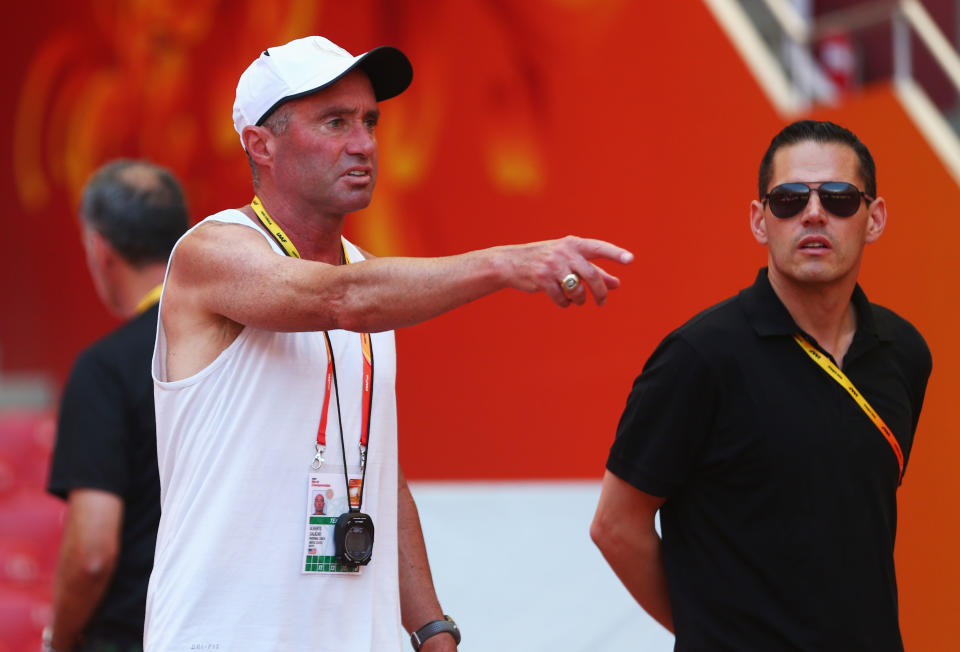Eight Nike Oregon Project athletes confirm Mary Cain's allegations of abuse to Sports Illustrated

Last week Mary Cain, once considered the future of American middle-distance running, recorded a scathing op-ed for the New York Times in which she alleged emotional abuse by Alberto Salazar while she was part of the vaunted Nike Oregon Project.
On Wednesday, Sports Illustrated published a story in which eight other Oregon Project runners validated Cain’s claims and in some cases revealed their own stories of abuse.
‘You can’t talk to kids about this stuff’
Cain’s allegations center on Salazar’s obsession with her weight, though the SI story shows she was not the only one the coach targeted.
A phenom at Bronxville High in Westchester, New York, Cain shattered numerous age group, high school and U.S. junior records; in 2013, at just 17, she qualified for the IAAF World Championships in the 1500 meters.
After graduating from high school, Cain signed with Nike and joined the Oregon Project, moving to Oregon to train with Salazar and his all-male coaching staff at Nike headquarters. She joined a group that included Matthew Centrowitz, Galen Rupp, Mo Farah and Kara Goucher, all of them among the best in the world at their respective events.
Cain said Salazar settled on an arbitrary number of 114 pounds for her target weight, and the abuse over her weight seemingly began not long after she arrived in Oregon.
During the 2015 indoor track season, Dr. Charles Cain, Mary’s father, called Salazar after multiple phone calls from his upset daughter.
“I would tell Alberto, ‘You can’t talk to kids about this stuff. It’s a problem.’ I asked them repeatedly and clearly to stop talking about her weight,” Charles Cain told SI.
In a statement to SI, Salazar continued to deny Cain’s claims, writing that he “did not know and was never told by Mary, her parents or any athletes that the discussion of weight was abusive.
“Because runner weight is inherently tied to performance for elite runners, I saw it as part of my job as an endurance sport coach to help the team’s runners understand the impact weight has on performance. I had a lot of frank discussions about weight with all of my athletes—both women and men.”
In May 2015, Cain was depressed and turned to cutting herself. She told the New York Times that after struggling in a 1500 race that spring Salazar had weight-shamed her in front of other runners, including non-Oregon Project athletes. That same night, Cain says, she told Salazar and Darren Treasure, the team’s so-called sports psychologist, that she was cutting herself and they ignored her.
‘Obsessed with your weight loss’
Cam Levins, a Canadian marathoner, told SI in a statement that he “absolutely” believes Cain and that he can “corroborate that she was told to lose weight and that by doing so she would be more successful.”
On Instagram, Levins wrote that he knew the coaching staff was “obsessed with your weight loss” and apologized as her former teammate for what had happened.
Olympian Dathan Ritzenhein also apologized for the abuse Cain experienced.
An Oregon Project runner from 2009-2014, Ritzenhein said, “She was so happy and full of joy. She was so young… As a father of a daughter who is not much younger than Mary was then, and as a coach of women, it makes me sick to see what happened to her.”
Cain and Ritzenhein shared a condo in Park City, Utah, while the two trained there, and Cain recalls stealing her teammate’s Clif Bars, sneaking the food to her room because she was afraid to let Salazar see her eating.
But Cain wasn’t the only one.
‘The biggest butt on the starting line’

Amy Yoder Begley trained with Salazar before Cain’s arrival to the Oregon Project and represented the United States in the 10,000 meters at the 2008 Olympics.
When she announced that she was leaving the Project in 2011 she cited injuries and differing views from Salazar on how to rehab, but after Cain’s revelations last week, Yoder Begley said she’d been kicked out.
“I was told I was too fat and ‘had the biggest butt on the starting line’,” Yoder Begley tweeted last week. “This brings those painful memories back... I have first hand experience with what [Cain] described in the [New York Times].”
Goucher remembers Yoder Begley having to be weighed in front of others before the 2008 Olympic Trials and Salazar telling her, “You have no shot. You’re too fat.”
Goucher said, “They were hung up on her butt. He was obsessed with the fact that it hung out of her shorts. She was tiny and it was a constant thing with her. They were so mean to Amy that it was crazy.”
Ritzenhein remembers similar things coaches said about Yoder Begley.
Steve Magness, who was an Oregon Project assistant coach in 2011-2012, reviewed records and told SI that Yoder Begley’s body fat percentage was 11.1 using a hydrostatic method and 12.4 using skin calipers. That’s a dangerously low percentage for women and can lead to health problems, beyond loss of one’s period.
Cain told the New York Times she had five broken bones during her time with Salazar, a possible side effect of her weight loss and low body fat.
Goucher’s weight was also a discussion among the coaching staff, particularly after she had her son in 2010.
Adam Goucher, Kara’s husband and another Oregon Project athlete tweeted that after the 2011 Boston Marathon, when Kara ran a personal-best time of 2:24:52 just six months after giving birth, Salazar approached him and said, “Don’t tell Kara, but she is still too heavy. She needs to lose her baby weight if she wants to be fast again.”
Calls for outside investigation
Salazar, a three-time winner of the New York City Marathon and one-time winner of the Boston Marathon, was handed a four-year ban by the U.S. Anti-Doping Agency (USADA) last month; not long after, Nike shut down the Oregon Project.
Nike CEO Mark Parker is stepping down after 13 years at the helm, though the company denies it had any ties to Salazar’s scandals.
But Nike is apparently opening an in-house investigation; Cain said an attorney with the company’s legal department had left her multiple voicemails, and Yoder Begley, Levins and Ritzehein had also gotten phone calls.
Cain, however, wants to see Nike open itself to an outside investigation.
“I believe Nike should investigate,” Cain said. “But I also believe it should not be Nike investigating themselves. … I would propose it be an organization such as USADA, the USOPC or SafeSport. We need a third party that is unbiased and will actually do the due diligence to determine what needs to change to actually support athletes going forward.”
Travis Tygart, the CEO of USADA, said there is a “mountain of evidence” on the toxic culture Salazar cultivated with the Oregon Project, and that a Nike’s investigation would simply be a “charade” to protect the now-iconic brand.
More from Yahoo Sports:


